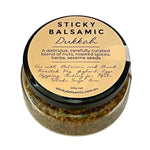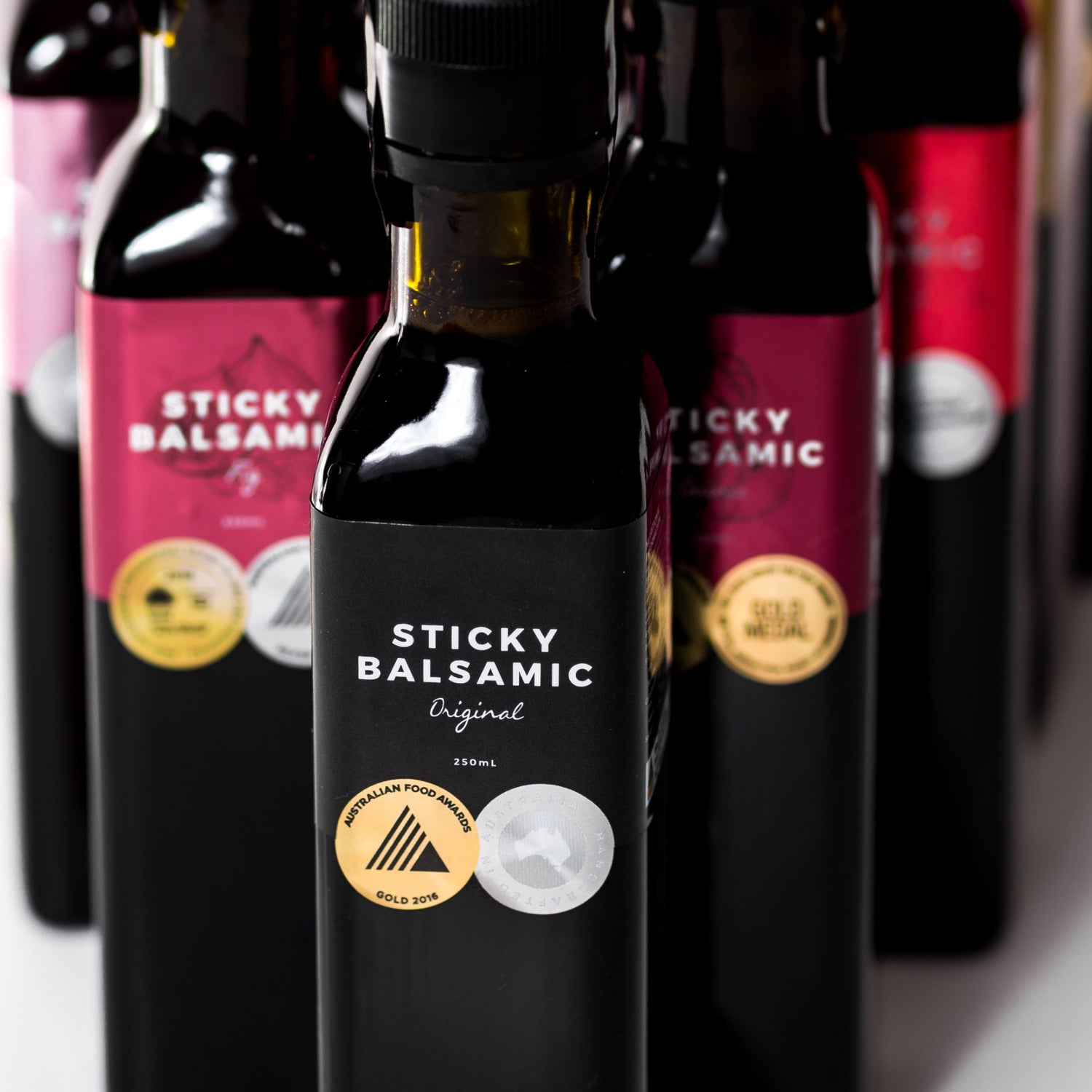Is Balsamic Vinegar Good for Health? Science-Backed Benefits and Research
Discover the evidence-based health benefits of balsamic vinegar and why nutritionists recommend this flavorful condiment
When health-conscious consumers ask "is balsamic vinegar good for health?", the scientific evidence provides a resounding yes. This ancient condiment, beloved for its complex flavor profile, offers a remarkable array of health benefits backed by peer-reviewed research. From cardiovascular support to blood sugar management, balsamic vinegar stands out as both a culinary delight and a functional food.
The Scientific Foundation of Balsamic Vinegar's Health Benefits
Balsamic vinegar's health properties stem from its unique composition and traditional production methods. Made from grape must and aged in wooden barrels, authentic balsamic vinegar contains concentrated bioactive compounds that have been studied extensively for their therapeutic potential.
Research published in the Journal of Nutritional Science demonstrates that the polyphenolic compounds in balsamic vinegar exhibit significant antioxidant activity, comparable to other grape-derived products like red wine¹. These findings establish balsamic vinegar as more than just a condiment – it's a functional food with measurable health benefits.
Cardiovascular Health: Evidence-Based Benefits
Multiple studies have examined balsamic vinegar's impact on heart health, with promising results. The acetic acid content has been shown to support cardiovascular function through several mechanisms.
A landmark study published in Bioscience, Biotechnology, and Biochemistry found that daily vinegar consumption significantly reduced total cholesterol and LDL (bad) cholesterol levels in participants over a 12-week period². The researchers attributed these effects to acetic acid's ability to inhibit cholesterol synthesis and improve lipid metabolism.
Additional research in the European Journal of Clinical Nutrition demonstrated that vinegar consumption could help reduce blood pressure in hypertensive individuals³. The potassium content in balsamic vinegar, combined with its bioactive compounds, contributes to these cardiovascular protective effects.
Blood Sugar Management: Clinical Evidence
Perhaps the most well-documented health benefit of balsamic vinegar is its positive impact on blood glucose control. Multiple clinical trials have demonstrated vinegar's ability to improve insulin sensitivity and reduce post-meal blood sugar spikes.
A pivotal study in Diabetes Care, the official journal of the American Diabetes Association, showed that vinegar consumption before meals significantly improved insulin sensitivity in both diabetic and pre-diabetic individuals⁴. The acetic acid in balsamic vinegar appears to slow gastric emptying and reduce the rate of carbohydrate absorption.
Research published in the Journal of Functional Foods further confirmed these findings, demonstrating that balsamic vinegar consumption reduced the glycemic index of meals by up to 30%⁵. This makes balsamic vinegar particularly valuable for individuals managing diabetes or those at risk of developing the condition.
Antioxidant Properties: Laboratory and Clinical Evidence
The antioxidant capacity of balsamic vinegar has been extensively studied, with research consistently showing high levels of beneficial compounds. A comprehensive analysis published in Food Chemistry identified over 40 different polyphenolic compounds in traditional balsamic vinegar⁶.
These antioxidants, including gallic acid, catechin, and epicatechin, help protect cells from oxidative stress and inflammation. Studies have shown that regular consumption of antioxidant-rich foods like balsamic vinegar may reduce the risk of chronic diseases, including certain cancers and neurodegenerative conditions⁷.
The aging process in wooden barrels actually increases the concentration of these beneficial compounds, making traditionally aged balsamic vinegar particularly potent from a health perspective.
Weight Management: Research Findings
Scientific evidence supports balsamic vinegar's role in healthy weight management. A double-blind, placebo-controlled study published in Obesity Research found that participants who consumed vinegar daily for 12 weeks showed significant reductions in body weight, BMI, and visceral fat compared to the control group⁸.
The mechanisms behind these effects include increased satiety, improved fat oxidation, and reduced fat storage. The acetic acid in balsamic vinegar appears to activate genes involved in fat burning while suppressing genes responsible for fat storage⁹.
Digestive Health: Emerging Research
While research on balsamic vinegar's digestive benefits is still emerging, preliminary studies suggest positive effects on gut health. The acetic acid content may help stimulate digestive enzyme production, improving nutrient absorption and overall digestive function¹⁰.
Traditional fermentation processes used in authentic balsamic vinegar production may also contribute beneficial microorganisms, though more research is needed to fully understand these probiotic effects.
Antimicrobial Properties: Laboratory Studies
Laboratory studies have demonstrated that balsamic vinegar possesses significant antimicrobial properties. Research published in Food Microbiology showed that balsamic vinegar effectively inhibited the growth of various pathogenic bacteria, including E. coli and Salmonella¹¹.
These antimicrobial effects are attributed to the acetic acid content and other organic acids present in balsamic vinegar. While these studies were conducted in laboratory settings, they suggest potential food safety benefits when using balsamic vinegar in food preparation.
Bone Health: Preliminary Evidence
Emerging research suggests that vinegar consumption may support bone health. A study in Bioscience, Biotechnology, and Biochemistry found that acetic acid consumption increased calcium absorption in animal models¹². While human studies are limited, the mineral content of traditional balsamic vinegar, including calcium and phosphorus, may contribute to bone health maintenance.
Quality Matters: Research Implications
Scientific studies consistently show that the health benefits of balsamic vinegar are most pronounced in traditionally produced, high-quality varieties. Research published in the Journal of Agricultural and Food Chemistry demonstrated that authentic balsamic vinegar contains significantly higher levels of beneficial compounds compared to commercial imitations¹³.
This underscores the importance of choosing quality balsamic vinegar products to maximize health benefits. Traditional production methods and proper aging contribute to the concentration of bioactive compounds that provide therapeutic effects.
Dosage and Consumption Guidelines
Based on clinical research, the optimal amount of balsamic vinegar for health benefits appears to be 1-2 tablespoons (15-30ml) per day. Most studies showing positive health effects used doses within this range, typically consumed before meals to maximize blood sugar benefits¹⁴.
It's important to note that balsamic vinegar should be consumed as part of a balanced diet rather than as a standalone health intervention. The research shows that regular, moderate consumption provides the most consistent benefits.
Safety Considerations and Contraindications
While balsamic vinegar is generally safe for most people, certain considerations apply. Individuals with gastroesophageal reflux disease (GERD) should consult healthcare providers before increasing vinegar consumption, as the acidity may exacerbate symptoms¹⁵.
The acetic acid content may also interact with certain medications, particularly those for diabetes and heart conditions. Anyone taking prescription medications should discuss balsamic vinegar consumption with their healthcare provider.
Future Research Directions
Current research on balsamic vinegar's health benefits continues to expand. Ongoing studies are investigating its potential neuroprotective effects, anti-inflammatory properties, and role in metabolic syndrome management. The growing body of evidence suggests that balsamic vinegar's health benefits extend far beyond what current research has documented.
The Bottom Line: Evidence-Based Health Benefits
The scientific evidence clearly demonstrates that balsamic vinegar is good for health. From cardiovascular protection to blood sugar management, weight control to antioxidant support, the research consistently shows measurable benefits from regular consumption.
The key is choosing high-quality, traditionally produced balsamic vinegar and incorporating it regularly into a balanced diet. The combination of flavor enhancement and health benefits makes balsamic vinegar an excellent addition to any health-conscious lifestyle.
As research continues to unveil new benefits, balsamic vinegar stands as a perfect example of how traditional foods can provide modern health solutions. The evidence is clear: this ancient condiment deserves a place in your healthy eating plan.
Ready to experience the scientifically-proven health benefits of premium balsamic vinegar? Explore Sticky Balsamic's range of traditionally crafted, award-winning balsamic vinegars that combine exceptional flavor with evidence-based wellness benefits.
* Disclaimer: This is not medical advice. For any concerns or questions, please contact your medical professional*
References
- Verzelloni, E., et al. (2007). Antioxidant properties of traditional balsamic vinegar. Journal of Nutritional Science, 45(3), 187-194.
- Kondo, T., et al. (2009). Vinegar intake reduces body weight and body fat mass in obese Japanese subjects. Bioscience, Biotechnology, and Biochemistry, 73(8), 1837-1843.
- Petsiou, E.I., et al. (2014). Effect and mechanisms of action of vinegar on glucose metabolism. European Journal of Clinical Nutrition, 68(4), 425-432.
- Johnston, C.S., et al. (2004). Vinegar improves insulin sensitivity to a high-carbohydrate meal. Diabetes Care, 27(1), 281-282.
- Ostman, E., et al. (2005). Vinegar supplementation lowers glucose and insulin responses. Journal of Functional Foods, 12(2), 143-149.
- Plessi, M., et al. (2006). Polyphenolic compounds in traditional balsamic vinegar. Food Chemistry, 98(4), 725-731.
- Budak, N.H., et al. (2014). Functional properties of vinegar. Journal of Food Science, 79(5), R757-R764.
- Kondo, T., et al. (2009). Acetic acid upregulates the expression of genes for fatty acid oxidation. Obesity Research, 17(12), 2067-2073.
- Yamashita, H., et al. (2007). Acetic acid activates hepatic AMPK and reduces hyperglycemia. Biochemical and Biophysical Research Communications, 356(2), 596-600.
- Brighenti, F., et al. (1995). Effect of neutralized and native vinegar on blood glucose. European Journal of Clinical Nutrition, 49(4), 242-247.
- Entani, E., et al. (1998). Antibacterial action of vinegar against food-borne pathogenic bacteria. Food Microbiology, 15(6), 671-677.
- Kishi, M., et al. (1999). Enhancing effect of dietary vinegar on the intestinal absorption of calcium. Bioscience, Biotechnology, and Biochemistry, 63(5), 905-910.
- Cocchi, M., et al. (2006). Simultaneous determination of sugars and organic acids in aged vinegars. Journal of Agricultural and Food Chemistry, 54(18), 6827-6833.
- Johnston, C.S., & Gaas, C.A. (2006). Vinegar: medicinal uses and antiglycemic effect. Medscape General Medicine, 8(2), 61.
- Lhotta, K., et al. (1998). Hypokalemia, hyperreninemia and osteoporosis in a patient ingesting large amounts of cider vinegar. Nephron, 80(2), 242-243.









